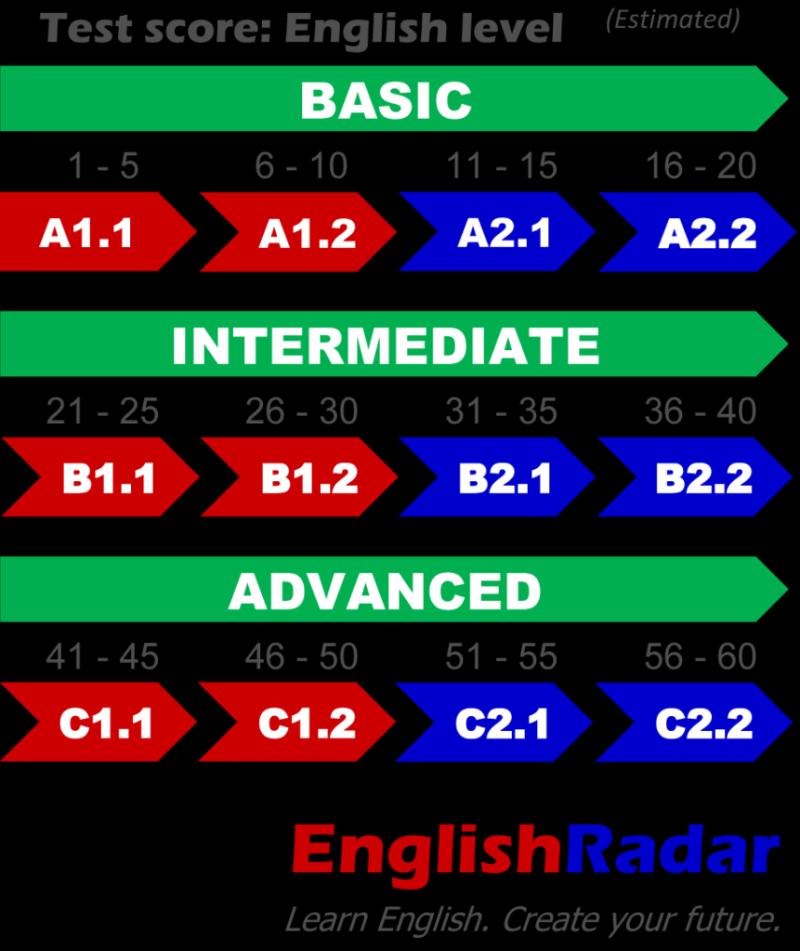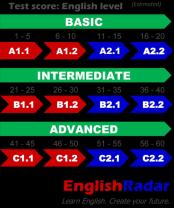How can I Know my English level?
There are various ways to assess your English proficiency level. Here are some common methods that you can use to determine your English proficiency:
Language Proficiency Tests:
- TOEFL (Test of English as a Foreign Language): A widely recognized English language proficiency test that assesses reading, listening, speaking, and writing skills.
- IELTS (International English Language Testing System): Another popular test that measures English language proficiency across similar skill areas.
- Cambridge English Exams (e.g., FCE, CAE, CPE): A series of exams designed for different proficiency levels, ranging from intermediate to advanced.
Placement Tests:
- Many language schools and programs use placement tests to assess the English proficiency of students and place them in appropriate courses.
Online Proficiency Tests:
- There are several online platforms that offer free English proficiency tests. These tests may cover grammar, vocabulary, reading, and listening skills.
English Language Apps:
- Language learning apps often include assessments to determine your proficiency level. These apps may use quizzes, interactive exercises, and voice recognition technology.
Self-Assessment Grids:
- Refer to the Common European Framework of Reference for Languages (CEFR) or similar proficiency frameworks. They provide detailed descriptors for each proficiency level, allowing you to self-assess your skills.
Speaking Assessments:
- Engage in conversations with native speakers or language partners. The ability to communicate effectively in spoken English is a key aspect of proficiency.
Writing Samples:
- Write essays, articles, or short pieces and have them evaluated by a teacher, tutor, or language exchange partner. Effective writing is an indicator of language proficiency.
Listening Comprehension:
- Listen to podcasts, watch English movies, or follow English news broadcasts. Assess your ability to understand spoken English at different speeds and accents.
Reading Comprehension:
- Read a variety of materials in English, such as books, articles, and newspapers. Assess your comprehension and ability to understand complex texts.
Language Schools and Tutors:
- Enroll in a language school or take private lessons with a tutor who can assess your proficiency through direct interaction and observation.
Workplace Assessments:
- Some employers may assess English proficiency as part of the hiring process or for job-specific requirements.
Language Exchange Programs:
- Participate in language exchange programs where you can interact with native English speakers and receive feedback on your language skills.
When using these methods, keep in mind that proficiency is often assessed across different skills (listening, speaking, reading, writing), and your overall proficiency level is a combination of these individual skills. Additionally, proficiency can be fluid and may improve with continued practice and exposure to the language.
How can I assess and determine my current English proficiency level?
Assessing your current English proficiency level is crucial for setting realistic goals and planning your learning journey. Here are some ways to do it:
Self-assessment:
- Reflect on your current skills: Evaluate your strengths and weaknesses in reading, writing, speaking, and listening. Consider how comfortable you are with different topics and situations.
- Take online quizzes: Various free online quizzes can estimate your English level based on multiple-choice questions covering grammar, vocabulary, and reading comprehension.
- Use language learning apps: Several apps like Duolingo and Memrise offer assessment features that gauge your progress and identify areas needing improvement.
Formal assessment:
- International English Language Testing System (IELTS): This standardized test is widely recognized for academic and professional purposes. It assesses all four language skills and provides a detailed score report.
- Test of English as a Foreign Language (TOEFL): Another standardized test popular for university admissions and professional settings. It focuses on reading, writing, listening, and speaking skills.
- Pearson Test of English Academic (PTE Academic): This computer-based test assesses your English skills in a real-world context. It offers fast results and flexible testing options.
- Cambridge English exams: These exams come in various levels and cater to different needs, like General English, Business English, and Young Learners. They assess reading, writing, speaking, and listening skills.
Additional resources:
- Common European Framework of Reference for Languages (CEFR): This framework provides a standardized way to describe language proficiency levels from A1 (beginner) to C2 (mastery).
- EF SET English Test: This free online test provides a quick and accurate estimation of your English level on the EF scale and the CEFR scale.
- English Language Learners Exchange (ELEX): This online community offers various resources and tests to help you assess your English proficiency and connect with other learners.
By combining self-assessment with formal or informal tests, you can gain a comprehensive understanding of your current English proficiency level. Remember, there's no single "correct" way to assess your English skills. The most important thing is to choose methods that are relevant to your goals and learning style.
Here are some additional tips for assessing your English proficiency:
- Be honest with yourself: Don't overestimate or underestimate your abilities.
- Focus on areas where you need improvement: Use the assessment results to identify your weaknesses and prioritize areas for learning.
- Monitor your progress: Regularly assess yourself to track your progress and adjust your learning strategies accordingly.
- Seek feedback from others: Ask teachers, tutors, or native speakers for their feedback on your English skills.
By taking the time to assess your English proficiency, you can gain valuable insights into your strengths, weaknesses, and learning needs. This will empower you to set realistic goals, choose appropriate learning resources, and track your progress towards fluency.






